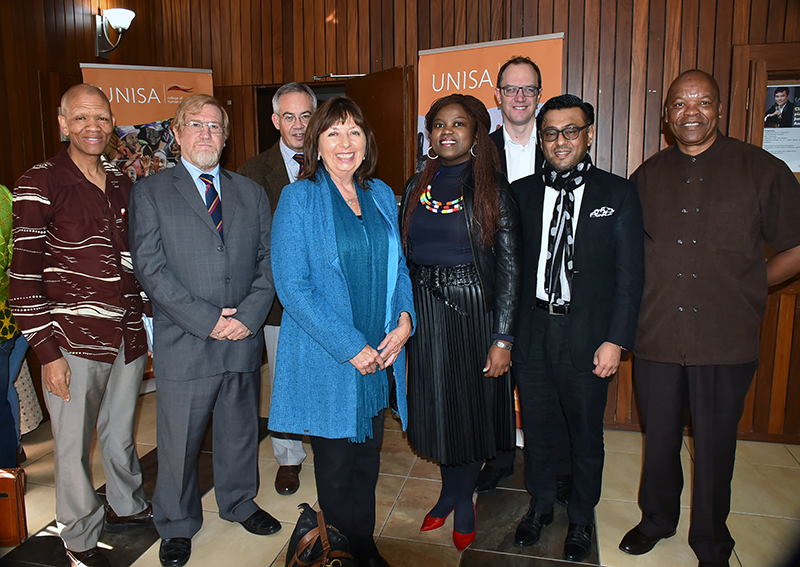
The African college of excellence in the social and human sciences

Prof. Kealeboga Maphunye (Unisa), Prof. Andries Velthuizen (Unisa), Professor Dirk Kotzé (Unisa), Professor Susan Booysen (political commentator), Palesa Kadi (ICASA Councillor), Grant Masterson (EISA), Ebrahim Fakir (political analyst), and Prof. Lesiba Tefo (Unisa)
The Unisa Department of Political Sciences, with support from the College of Law and the College of Human Sciences, held a pre-election seminar. They invited different experts in the political sphere, whose purpose was to reflect and unpack the dynamics of the ongoing election processes in order to predict what might become of the upcoming elections. The speakers were Palesa Kadi, Professor Susan Booysen, Grant Masterson, and Professor Lesiba Tefo.
Kadi, a member of the Independent Communications Authority of South Africa Council, reflected on the impact of media on politics. She said that access to information had changed overtime and that this had led to the world of politics opening up even more. She highlighted that ICASA and the Broadcasting act are a regulating mechanism that makes sure that information is distributed equitably in this regard. “We are now able to understand the views, media freedom, digital rights of citizens and political manifestos,” she said. She continued saying that this in turn helped people to make informed choices about which party to vote for and gave platforms to complain should anyone have a grievance.
Masterton, from the Electoral Institute of Sustainable Democracy in Africa, discussed some of the watershed events of the last five-year period in the electoral cycle. He did a political analysis of the constitutional democracy. In the last five years, he noted that the announcement of the nine twelve event and the changing of the finance minister marked a significant change in the political sphere. It had a major impact on stakeholders, why, and how decisions were made.
Booysen, a political commentator, talked about the promises of a better life for all by political parties. She claimed that the story of the elections was a very ANC-centred story, and spoke on the concerning nature of the conflict within the ANC. She believes that there is much voter uncertainty.
Tefo spoke about small parties/multipartism and made some reflections about this year’s elections. Multipartism, he said, could work against South Africa’s future going ahead. Voting for small parties is a waste as they need a certain percentage to be represented. He added that small parties only receive a fraction of the vote which will be thrown away; they lack ambition and are dangerous for what we want to achieve as a country.
He made a differentiation between political literacy and political education and said that South Africa was lacking in these two areas. He says that the country needed to grow in political will and education because people had to be able to empower themselves with the necessary knowledge to be able to contest and contend with ideologies and manifestos.
Jean-Jacques Boshoff, co-organiser and lecturer in the Department of Political Sciences, said the facilitation of the political debate during the pre-election period contributed significantly to the consolidation of democratic principles in South Africa. The election debate hosted by the department not only contributed to the democratic discourse leading up to the election but also provided voters and the society to engage with the ideas of political parties on a critical platform.
*By Siphesihle Jojo
Communication and Marketing Assistant
College of Human Sciences
Publish date: 2019-05-30 00:00:00.0